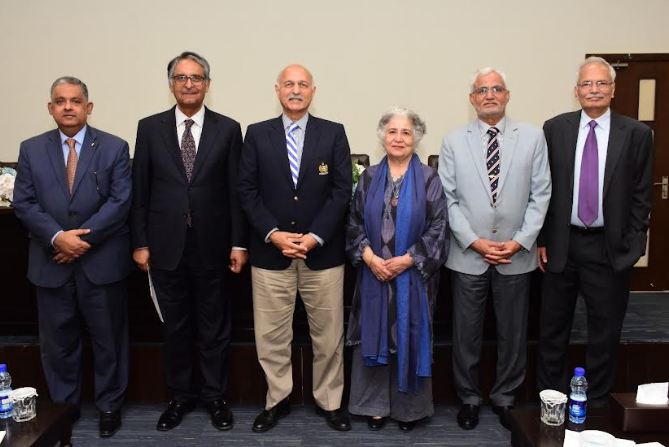DNA
ISLAMABAD, MAY 16: The Centre for Aerospace & Security Studies (CASS) organised a seminar titled ‘KSA- Iran Rapprochement and its Implications: Way Forward for Pakistan’ in Islamabad, featuring renowned speakers. The seminar shed light on the political, economic, and security implications of the KSA-Iran rapprochement for the Middle East, Central Asia, West Asia, South Asia, and Pakistan.
Keynote Speaker Senator Mushahid Hussain Sayed, Chairman of the Senate Standing Committee on Defence, Senate of Pakistan, delivered a compelling address, highlighting the regional impact of the Saudi-Iranian reconciliation. Other eminent speakers included Prof. Dr Syed Rifaat Hussain, Former Member of the Prime Minister Advisory Committee on Foreign Affairs; Ambassador Riffat Masood, Former Ambassador of Pakistan to Iran; and Ambassador Rizwan Saeed Sheikh, Additional Secretary (Middle East), Ministry of Foreign Affairs, Government of Pakistan. The seminar concluded with the remarks of President CASS Air Marshal Farhat Hussain Khan (Retd), and Ambassador Jalil Abbas Jilani, Advisor, Foreign Policy at CASS, moderated the proceedings.
Ambassador Jalil Abbas Jilani, in his Opening Remarks, underlined the significance of the KSA-Iran rapprochement and its far-reaching implications on political, economic, and security aspects in the Middle East and beyond, especially on the peace process, regional unity, and stability. He said that the longevity of this rapprochement was a crucial concern that necessitated further discussion. Ambassador Jilani underscored the implications of the KSA- Iran rapprochement on political and economic development in Pakistan in terms of regional connectivity. He was of the view that it was important to discuss China’s role in this process in light of United States being a major player in the region as well.
In his Keynote Address on ‘Iran-Saudi Rapprochement and Pakistan,’ Senator Mushahid Hussain Sayed discussed the surprising developments in the Middle East, such as Syria’s return to the Arab League and peace talks in Yemen, which reflected regional initiatives devoid of Western influence. He highlighted the changing realities of the Middle East, including the transformation of Saudi Arabia, the entry of China, and the declining role of the US. Senator Sayed expressed optimism about the longevity of the rapprochement, considering China’s interests in the region and Pakistan’s positive relationships with China, Iran, and Saudi Arabia. He concluded by stating that Pakistan should seize this historic opportunity as it was at the centre of this transformative change.
Dr Syed Rifaat Hussain, in his address on ‘Iran-Saudi Rapprochement and its Impact on Middle East Politics,’ highlighted several key factors that had led to KSA-Iran reconciliation. He stated that these factors included failure of the dual containment policy, continuous sanctions on Iran, and the rise of pragmatic leadership in Iran and Saudi Arabia. He added that the rapprochement signified a significant shift in the Middle East, where the politics of confrontation and polarisation had now become redundant. Dr Hussain said that the KSA-Iran rapprochement emphasised the significance of resolving disagreements through dialogue, indicating a shift towards diplomacy and peaceful negotiations.
Ambassador Rizwan Saeed Sheikh addressed the subject of ‘Iran-Saudi Rapprochement: Impact on Regional Security, Economic Development & Way Forward for Pakistan.’ Ambassador Riffat Masood discussed the ‘Iran-Saudi Rapprochement: Future Prospects.’ Both speakers elaborated on the factors driving the reconciliation between Saudi Arabia and Iran, such as economic and strategic interests. They highlighted the need for change and peace in the region, citing economic hardships faced by Iran due to sanctions and Saudi Arabia’s pursuit of opportunities in the Iranian market. They also agreed that China’s role in brokering the agreement was vital, given its interest in a stable neighbourhood for the Belt and Road Initiative (BRI).
In the Concluding Remarks, President CASS, Air Marshal Farhat Hussain Khan (Retd) expressed gratitude to the speakers for their insightful analysis of the KSA-Iran rapprochement, particularly its impact on Pakistan’s security and economic development. He reinforced the importance of seizing this opportunity and for Pakistan to proactively engage in regional trade, especially with Iran and adapt to the emerging environment. He was of the view that by capitalising on this opportunity, Pakistan could gain significant benefits in trade, external and internal security, and overall progress. But to do so, the country needed to put its own house in order first, he stressed.
The seminar was attended by retired military officers, scholars from various think tanks, journalists, and students, who actively participated in the interactive question and answer session.












